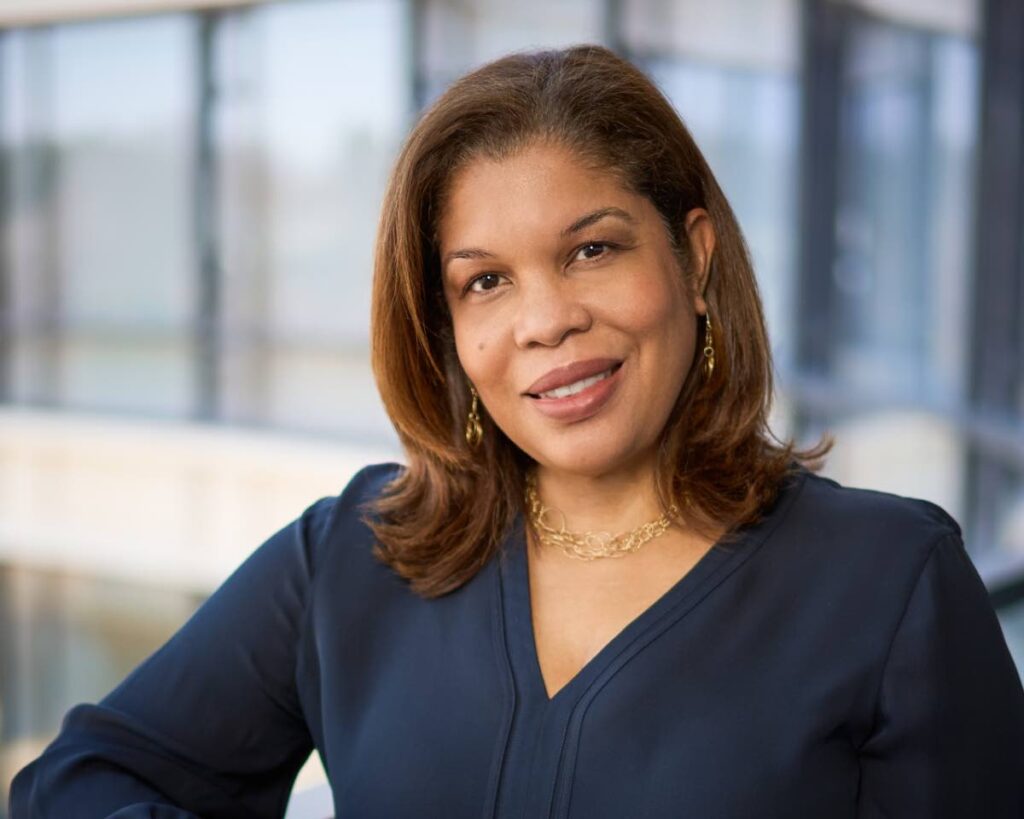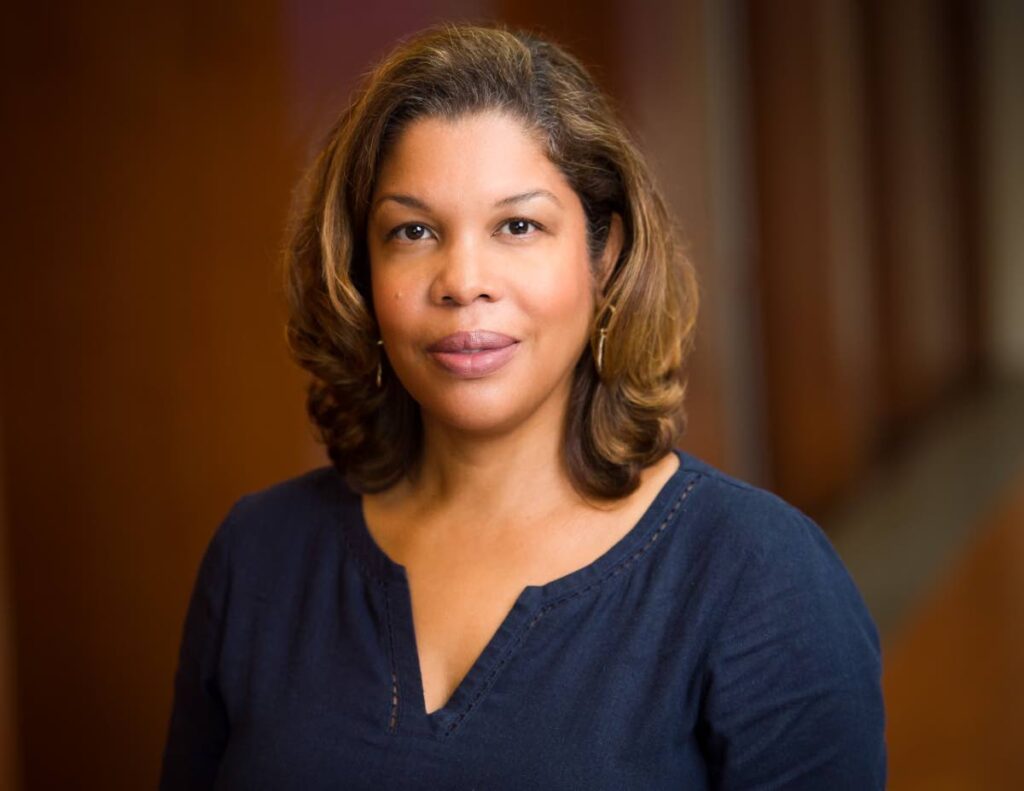Trini-born Tonya Villafana leads AstraZeneca's vaccine team

TT-born Tonya Villafana is the global franchise head, vaccines and immune therapies, at AstraZeneca, the British-Swedish multinational pharmaceutical and biotechnology company and developer of the Oxford/AstraZeneca covid19 vaccine.
Newsday caught up with Villafana who talked about her career, her life and the vaccine.
What was it like growing up in Trinidad?
I grew up in Trinidad and it really was obviously a wonderful experience to grow up on a Caribbean island in the 70s and 80s.
My love for science began with my schooling in TT, particularly when I went to high school at St Joseph's Convent in Port of Spain. And I was really encouraged to follow my passion, follow science. And I did that all through high school and was supported in developing all of my interests in the scientific field from a very early age, both at home by my parents, but also at school.
When and how did your interest in the medical field begin?
I always had an interest in science, and when I went to college, learned so many new and different things especially in the biological sciences.
It really was as an undergraduate that I became more interested in the field of immunology. The field was blossoming at the time, particularly with the HIV pandemic, which helped to push the boundaries of science and what we understood about the immune system.
As an undergrad, I had the opportunity to study and work in a laboratory where we were learning about HIV and other retroviruses and where we were in the early stages of developing DNA vaccine technology.
How and why did you get involved in the field of immunology?
I was excited by my first classes as an undergrad and by my lab studies. When the time came to go to graduate school, I wanted to focus on immunology as my foundational area of expertise and training. During my training and in my career I have focused on how the immune system works both in states of health and disease and specifically in the fields of rheumatology and infectious disease.
What about your work with malaria?
Around 2001, I moved to sub-Saharan Africa to work on HIV vaccine development and worked on setting up some of the first phase 1 vaccine studies in the sub-Saharan African region. I was based in Botswana, and I did that for about five years, working for a collaboration between the Ministry of Health of Botswana and the Harvard School of Public Health (where I had trained in public health), working in the field and conducting HIV studies in sub-Saharan Africa.
Towards the end of my time there, I joined a group that was developing a malaria vaccine in sub-Saharan Africa, so I had the opportunity to be part of the team that conducted very important trials for the first approved malaria vaccine.
I moved back to the US, but I was working mostly in Africa on the malaria vaccine. So I was travelling back and forth to Tanzania, to Gabon, Senegal and other countries.
I'm really excited about where that vaccine is today. In October 2021, the vaccine was endorsed by the World Health Organization (WHO) for "broad use" in children, making it the first malaria vaccine candidate, and first vaccine to address parasitic infection, to receive this recommendation.
How were the early days of the pandemic?
The early days of the covid19 pandemic were exhausting and exhilarating.
At AstraZeneca, we were committed to help and we were dedicated to make a difference in the pandemic. And so I had the opportunity to work and lead the R&D efforts of our vaccine in collaboration with Oxford University.
I don't think I've ever worked as hard in my life and I've never worked with a group of people who were so passionate, dedicated and resilient to get this done, develop a vaccine and a monoclonal antibody for covid19.
We were working 24/seven. I mean, it was like 15-20-hour days. Some days, I would sleep for a few hours and get up and just start working again. So it was really an intense period as we got all the studies up and running around the world for the vaccine programme in collaboration with the Oxford team.
Tell us about the development of the vaccine. How was that experience?
I remember we decided very early on that we wanted to develop a vaccine for the world, and we wanted to do it not for profit during the pandemic. This was our commitment with Oxford.
We worked so closely between our teams at Oxford and AstraZeneca. Our teams are all over the world and adjusting to virtual meetings and being on with each other constantly was also a huge change in our normal ways of working. As we were planning and conducting clinical studies, my colleagues in our operations and manufacturing groups were in parallel scaling up manufacturing across the world to ensure that we could supply in all regions around the world.
It was really intense and very exciting. We felt like we were racing against the clock.
What was the feeling when it was finally developed?
Overwhelming, just overwhelming pride that we did this, that we were going to help so many people and that I knew that my family would get it, right. I knew that people, in TT, and my family in Africa (my husband is from Senegal) would have access to this vaccine and that we could help so many people around the world. It was just an incredibly moving experience.
My first meeting in 2021 was at four in the morning preparing for the vaccine rollout.
What does a typical day for you look like?
It's still quite busy because the covid19 pandemic continues and we need to still keep getting vaccines into the arms of people.
But I work on many other projects other than the covid19 vaccine.

What are you currently working on?
I mentioned that we have also developed a monoclonal antibody (mAb) combination for covid19 which is potentially another option for vulnerable people such as the immunocompromised who cannot mount an adequate response to vaccination.
It is the first monoclonal antibody to be studied both for pre-exposure prophylaxis and for treatment of covid19. We have submitted for Emergency Use Authorisation in the US. So that's an important potential solution for very vulnerable people as well.
I also work on respiratory syncytial virus (RSV), and that's also a virus that has returned with a vengeance since we're slowly getting covid19 under control. RSV is a virus that causes the most amount of acute lower respiratory tract infection in babies worldwide.
We've developed a novel monoclonal antibody to address this disease and will submit the data from pivotal studies to regulatory agencies around the world.
Anti-vaxxer sentiment is an increasing problem. What would you say to someone who subscribes to those beliefs?
Vaccines are the most important public-health interventions that have occurred in the past two centuries.
I think it's really important to understand and to inform yourself of how vaccines work and the potential to really protect people from having the most severe outcomes related to disease.
We (scientists, public health leaders, political leaders and the media) need to do a better job of educating people about the importance of vaccines.
Think of what the world would be like if we didn't have vaccines for smallpox, for polio, for measles, mumps, and rubella, and many of the vaccines we routinely give to children today.
We will continue to need vaccines in the future. New diseases may emerge for which we must develop new vaccines and other preventive drugs or interventions.
We just need to look at history and look at how innovation in vaccines and medicines have enabled all of us to move forward both from a public health perspective and from an economic development perspective. Think about how important it is for each of us to be vaccinated, to protect the people around us and those most vulnerable in our families from having the most serious outcomes related to infectious diseases.
What do you do when you’re not working?
I spend time with my family. I love to travel. I love to cook. I spend time with my daughter, my husband and my mom. I enjoy eating great meals, going to dance performances, listening to live music and I'm slowly looking forward to coming back home and to the region and enjoying some sun and sea in the Caribbean. That's what I like to do. I haven't been able to do much of it in the past two years.
What does your family in Trinidad think of your accomplishments and how often do you visit?
Well, pre-pandemic, I was home at least once a year, and my family is incredibly supportive and very proud, and they have all been vaccinated. I am lucky, I have a very supportive family, and so that's great. And they've always encouraged me to pursue my passion.
And you know, they tell me how things are going and Trinidad and what people think. So it's good to get their feedback and they keep me grounded.
Final message to reinforce all the public around vaccination and the importance of it.
I believe getting vaccinated against covid19 is really fundamentally important to stopping the pandemic and that vaccines are making a difference.
Most importantly, vaccines prevent against the worst outcomes of covid19 and the most severe disease.
We owe it to ourselves and to our communities to be vaccinated so we can all return to our everyday lives.


Comments
"Trini-born Tonya Villafana leads AstraZeneca’s vaccine team"